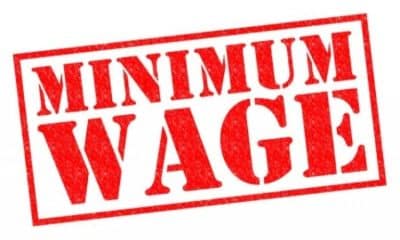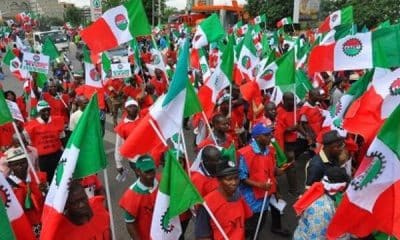Business
2024: Economy Will Remain Bleak For Next Six Months — NECA

Nigeria Employers’ Consultative Association (NECA) has issued a cautionary statement, indicating that there won’t be significant growth in the nation’s economic outlook for the next six months, foreseeing a persistently bleak economy.
Despite this, NECA, representing employers nationwide, assured that signs of growth would likely emerge thereafter.
NECA’s Director-General, Adewale-Smart Oyerinde, shared in a conversation with Vanguard that 2023 is anticipated to be highly challenging for businesses.
Adewale-Smart Oyerinde expressed concerns about the economic challenges faced by organised businesses in 2023.
He attributed this difficulty to factors such as the removal of petrol subsidy and the harmonisation of foreign exchange.
He cited the COVID-19 pandemic as a major obstacle, while other issues such as tax, policy inconsistency, regulatory and legislative interference, and the removal of fuel subsidies as major issues.
Oyerinde underscored the significance of the new government’s endeavours to rectify previous fiscal imprudence and synchronise fiscal and monetary policies, acknowledging these efforts as positive. However, NECA expresses the hope that the implementation of these policies will yield tangible and positive results by 2024.
The NECA’s Director-General also noted that the first and second quarters might not be definitive quarters for the economy, but the end of the year may be more favourable.
Oyerinde emphasised the importance of the government actively implementing its ongoing reforms and other pragmatic measures to stimulate economic recovery.
He said, “2023 was a year in which we had significant economic challenges that created different dynamics for organised businesses.
“While trying to surmount the obstacles that COVID threw in our ways, other challenges that we created for ourselves as a people continued to dig us deeper into the hole.
“It is now stale news to say tax remains top of the issue that organised businesses faced. Policy inconsistency from 2022 up to the early part of 2023 was also a serious challenge that organised businesses faced.
“While the last administration made promises, the rate of reversal of those policies made it very difficult for organised businesses to plan.
“Similarly, regulatory and legislative incursion and harassment negated all the attempts at improving the ease of doing business.
“These were the things that we faced in the early part of 2023.”
He noted that after the general elections, “The new government came up and removed fuel subsidy which naturally increased the cost of doing business and living. Just as energy cost skyrocketed, the cost for logistics also skyrocketed.
“The harmonisation of the exchange rate also came with its own dynamics.
“The value of naira plummeted significantly, and we are still trying to find a balance. Forex, which remains scarce, also had serious effects on the cost of doing business for organised businesses, especially those compelled to import inputs.
“All of these things created problems for organised businesses.
“Though some have said the government is only seven-month-old and it has started on a good trajectory by trying to reverse the pattern of recklessness that we witnessed in the past, we hope that the effect of those policies will start coming to fruition as quickly as possible this New Near.
“We know that the last administration supported the naira with over N150 billion on a monthly basis for us to have a seemingly workable naira exchange rate.
“This government has stopped that pattern. It also stopped the pattern of fuel subsidy that had become a deep hole in the country’s pulse while aligning the fiscal and monetary policy environment.
“This is a positive for us. We are hoping that the foundation that they have set will create an opportunity for the economy to start booming before the end of 2024, so that the pattern of businesses exiting the country and the high rate of employment will reduce significantly.
“For us, 2023 was a challenging year and we hope that the steps taken by this administration will yield positive results this 2024.”
On the economic outlook for this year, the NECA’s Director-General said, “The first and second quarters might not be called definitive quarters for us.
“Probably, the end of the second quarter to the end of the year might be more friendly.
“For instance, there was a report that the dollar inflow to the country has increased by about four per cent.
“We also know that the Taiwo Oyedele Presidential Committee on Fiscal and Monetary Reforms will round off its work between the first and second quarters of 2024 with the expectations that the implementation of far-reaching recommendations of that committee will start coming up to make the tax environment much more friendly and make tax collection much more efficient as well as reduce the burden of multiplicity of taxes on organised businesses.
“If that is done, it will create a bit of dynamics within the context of multiplicity of taxes – both legal and illegal – that organised businesses are paying.“












